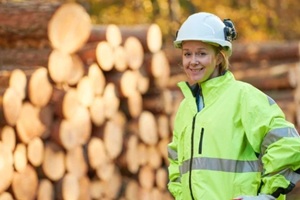
The logging industry is, by nature, one faced with extreme conditions regularly. From the rugged wilderness where strong trees can be found for harvest to the narrow, often unpaved roads that lead there, logging companies face many opportunities for something to go wrong at any stage of the job. For this reason, every company that harvests timber should carry logging insurance that covers both the equipment and the employees, which makes the job work smoothly.
For an operation considering the best logging insurance for their situation, a few essential factors can help to determine ideal coverage: the most common risks, the mandatory minimum coverage requirements, and specialized needs exclusive to that company.
Here is an exploration into which insurance types logging companies may need, especially for their employees.
Extreme Weather Conditions Faced by Logging Employees
To determine which insurance protection is most valuable for an operation, a business owner must consider the extreme weather conditions their employees will face. Heavy rainfall, flooding, and landslides remain some of the most common issues due to the location of most land tracts in rugged, variegated terrain.
Those working in the winter will face the possibility of snowstorms and icy weather that can lead to injury, equipment malfunction, and vehicle accidents. Loggers may even need to contend with high winds or hurricanes in some areas of the country!
Essential Insurance Coverage for Logging Employees and Equipment
The perils a company’s employees face on the job are just a small fraction of the overall risk they should be insuring against. During transit, employees and equipment are subject to hazardous road conditions—often in extreme weather—accidents from slippery or muddy terrain, and damage to the trucks or cargo.
With this in mind, a logging company may find that the insurance it values extends beyond just what is required at the work site. The most complete insurance coverage will typically include:
- Workers’ Compensation for Injury Protection – Mandatory in most states, workers’ compensation insurance safeguards the employees who are risking life and limb to harvest timber. This insurance can compensate families if their loved one passes away due to a work-related event or injury. Ideally, a company maintains safety standards that prevent loss of life, requiring workers’ compensation only to pay for medical treatment and rehabilitation in case of an injury.
- Liability Insurance for Employee Safety Incidents – Employees may strive to do their best to use dangerous equipment and vehicles correctly, but accidents happen. Suppose the employee causes harm to a third party or that person’s property. In that case, the logging company is on the hook for out-of-pocket compensation unless they have insurance coverage.
- Physical Damage Coverage for Vehicles and Equipment – The entire timeline may collapse if a logging company’s vehicles and equipment are damaged while on the job. Carrying insurance coverage for physical damage can restore broken machinery as soon as possible at minimal cost so the logging project can continue. For the broadest protection, pair physical damage insurance with equipment breakdown coverage.
Specialized Coverage for High-Risk Situations

All logging is considered high risk, but for businesses operating in perilous territory, the above insurance coverages may be the tip of the iceberg. For these companies, additional insurance is recommended; most frequently, it is business interruption insurance. There is no way to predict what will occur on a job site. Still, in harsh terrain, weather-related delays are especially common.
Heavy rain can cause landslides that keep employees off their dedicated tract for days or weeks at a time, and a forest fire can require evacuation for safety reasons. In instances such as these, business interruption insurance protects against the loss of revenue during this extended downtime.
Some business interruption insurance policies provide only minimal coverage. In contrast, others can fully compensate for the opportunity cost of waiting until employees can return to work. Business interruption coverage will generally address expenses such as facility and equipment rent, employee payment, and utility bills during the company’s downtime.
Protect Your Logging Team With Burton & Company
Any logging team will face significant danger throughout their forestry work. To protect these employees and their equipment, logging companies should invest in a strong portfolio of insurance coverage provided by an insurer with years of experience in the forestry industry.
The professionals at Burton & Company have deep expertise in logging insurance, so we can offer customized recommendations that directly address the risks most impactful to your business. Contact Burton & Company today for a personalized insurance solution to keep your people and equipment safe, even in the most extreme conditions.

